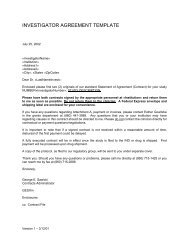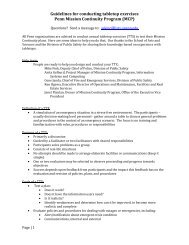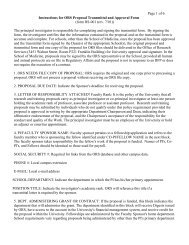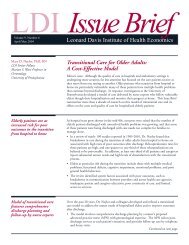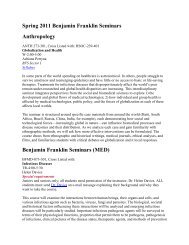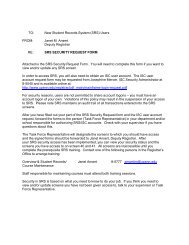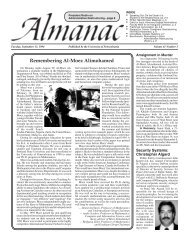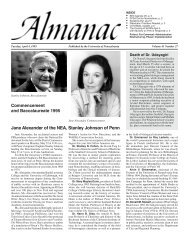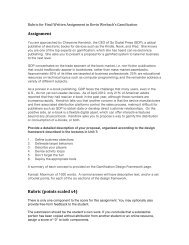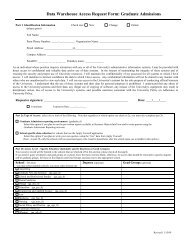2009-2010 COURSE REGISTER - University of Pennsylvania
2009-2010 COURSE REGISTER - University of Pennsylvania
2009-2010 COURSE REGISTER - University of Pennsylvania
Create successful ePaper yourself
Turn your PDF publications into a flip-book with our unique Google optimized e-Paper software.
Aime Cesaire. Examples <strong>of</strong> a thematic<br />
approach: writing and national identity,<br />
postcolonial conditions, autobiography.<br />
SM 610. (HIST610) Colloquium in<br />
American History. (A) Staff.<br />
This course is cross-listed with HIST 610<br />
when the subject matter is related to<br />
African, African American, or other<br />
African Diaspora issues.<br />
See the Africana Studies Program's website<br />
at www.sas.upenn.edu/africana for a<br />
description <strong>of</strong> the current <strong>of</strong>ferings.<br />
SM 624. (SOCI624) Race Relations in<br />
American Cities. (M) Staff.<br />
The ethnograhic study <strong>of</strong> race relations in<br />
the United States. The social life and<br />
culture <strong>of</strong> urban race relations in the United<br />
States will be emphasized, stressing<br />
conceptual and methodological issues.<br />
Selected ethnographic literature will be<br />
read and discussed. Students will be<br />
expected to carry out an ethnographic site<br />
study.<br />
SM 640. (ENGL600) Proseminar in<br />
Africana Studies. (E) Beavers, Charles,<br />
Jackson, Thomas, Zuberi.<br />
This course focuses on the historical and<br />
cultural relationship between Africans and<br />
their descendants abroad.<br />
SM 701. (AFST701, ANTH701,<br />
ENGL775, HIST701) African<br />
Aesthetics. (B) Ben-Amos, Hardin.<br />
Interdisciplinary seminar for discussion <strong>of</strong><br />
issues <strong>of</strong> special interest to graduate<br />
students and faculty in African Studies.<br />
Topics vary according to the interests and<br />
expertise <strong>of</strong> instructors.<br />
SM 705. (AFST705, ANTH705,<br />
FOLK715, MUSC705) Seminar in<br />
Ethnomusicology. (A) Muller.<br />
In the contemporary jazz canon women<br />
rarely feature as significant players in the<br />
production <strong>of</strong> jazz history: jazz is a field <strong>of</strong><br />
artistic and popular production largely<br />
determined by male performers, critics and<br />
scholars. Combining close reading and<br />
close listening, this seminar will consider<br />
ways in which women might begin to be<br />
written into the larger jazz narrative, both<br />
within the United States and abroad, by<br />
expanding the criteria by which "jazz" is<br />
defined, and examining the archive out <strong>of</strong><br />
which jazz narratives are constructed. A<br />
portion <strong>of</strong> the seminar will focus on jazz<br />
performers <strong>of</strong> the twentieth century African<br />
Diaspora.<br />
SM 706. Introduction to Africa and<br />
African Diaspora Thought. (C) Staff.<br />
This course examines the processes by<br />
which African peoples have established<br />
epistemological, cosmological, and<br />
religious systems both prior to and after the<br />
institution <strong>of</strong> Western slavery.<br />
SM 708. Cultural and Literary Theory<br />
<strong>of</strong> Africa and the African Diaspora.<br />
(C) Staff.<br />
This course introduces students to the<br />
theoretical strategies underlying the<br />
construction <strong>of</strong> coherent communities and<br />
systems <strong>of</strong> representation and how those<br />
strategies influence the uses <strong>of</strong> expressive<br />
culture over time.<br />
SM 710. Political Economy and<br />
Social History <strong>of</strong> Africa and the<br />
African Diaspora. (E) Zuberi.<br />
This course provides the opportunity for<br />
students to investigate the relationship<br />
between the emergence <strong>of</strong> African peoples<br />
as historical subjects and their location<br />
within specific geopolitical and economic<br />
circumstances.<br />
SM 770. (COML773, ENGL770) Afro-<br />
American American Literature. (M)<br />
Staff.<br />
An advanced seminar in African-American<br />
literature and culture.<br />
SM 771. (FOLK770, MUSC770)<br />
Seminar in Afro-American Music. (M)<br />
Ramsey.<br />
This seminar treats selected aspects <strong>of</strong> the<br />
history, aesthetics, criticism and<br />
historiography <strong>of</strong> African-American music.<br />
Topics will vary each time this course is<br />
<strong>of</strong>fered.<br />
SM 798. (SWRK799) Advanced<br />
Topics. (M) Staff.<br />
This course is cross-listed with SWRK 799<br />
(Advanced Topics) when the subject matter<br />
is related to African, African American, or<br />
other African Diaspora issues. A recent<br />
topic is "Critical Race Theory."<br />
See the Africana Studies Program's website<br />
at www.sas.upenn.edu/africana for a<br />
description <strong>of</strong> the current <strong>of</strong>ferings.<br />
African Language Courses<br />
170. (AFST170, AFST517)<br />
Elementary Yoruba I. (A) Staff. Offered<br />
through Penn Language Center.<br />
This is an introductory course in Yoruba<br />
whose goals are to introduce students to the<br />
history, geographical location <strong>of</strong> the people<br />
AFRICANA STUDIES<br />
who speak Yoruba, their culture, customs,<br />
and traditions; and to enable students to<br />
develop communicative skills through<br />
listening, speaking, reading, and writing.<br />
171. (AFST171, AFST518)<br />
Elementary Yoruba II. (B) Staff.<br />
Prerequisite(s): AFAM 170 or permission<br />
<strong>of</strong> the instructor. Offered through the Penn<br />
Language Center.<br />
This course continues to introduce basic<br />
grammar, vocabulary, and the reading and<br />
writing <strong>of</strong> Yoruba to new speakers.<br />
180. (AFST180, AFST580)<br />
Elementary Swahili I. (A) Staff. Offered<br />
through the Penn Language Center.<br />
Beginning level <strong>of</strong> Swahili which provides<br />
training and practice in speaking, reading<br />
and writing with initial emphasis on<br />
speaking and listening. Basic grammar,<br />
vocabulary, and cultural skills learned<br />
gradually with priority on the spoken<br />
language. Especially during the second<br />
term folktales, other texts, and films will be<br />
used to help introduce important aspects <strong>of</strong><br />
Swahili culture.<br />
181. (AFST181, AFST581)<br />
Elementary Swahili II. (B) Staff.<br />
Prerequisite(s): AFAM 180 or permission<br />
<strong>of</strong> the instructor. Offered through the Penn<br />
Language Center.<br />
This course continues to introduce basic<br />
grammar, vocabulary, and the reading and<br />
writing <strong>of</strong> Swahili to new speakers. During<br />
this term, folktales, other texts, and film<br />
selections are used to help introduce<br />
important aspects <strong>of</strong> Swahili culture and the<br />
use <strong>of</strong> the language in wide areas <strong>of</strong> Africa.<br />
185. (AFST185, AFST585)<br />
Elementary Swahili: Accelerated. (C)<br />
Staff. Offered through the Penn Language<br />
Center.<br />
An intensive beginning level course<br />
covering materials in AFRC 180 & 181<br />
emphasizing spoken language and<br />
conversational skills. It provides training<br />
and practice in speaking, reading, and<br />
writing with initial emphasis on speaking<br />
and listening. Basic grammar, vocabulary,<br />
and cultural skills are learned gradually<br />
through practice in speaking, listening,<br />
reading, and writing, with priority on the<br />
spoken language. Folktales, other texts,<br />
and film selections will be used to help<br />
introduce important aspects <strong>of</strong> Swahili<br />
culture and the use <strong>of</strong> the language in wide<br />
areas <strong>of</strong> Africa.<br />
240. (AFRC540, AFST240, AFST540,<br />
NELC481) Elementary Amharic I. (A)<br />
Staff. Offered through the Penn Language<br />
Center.<br />
Page 17




